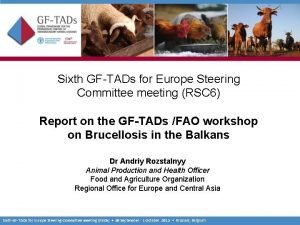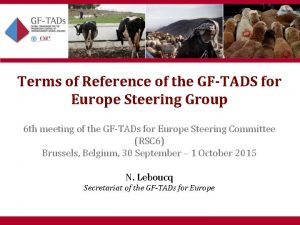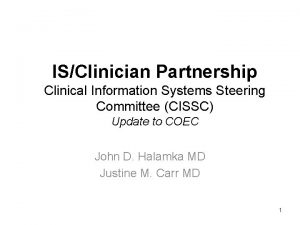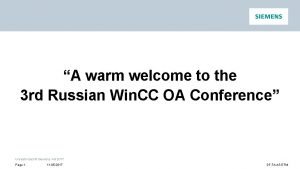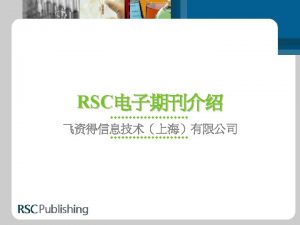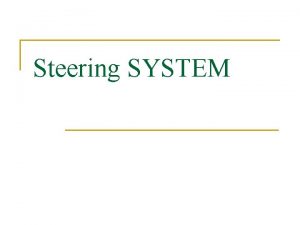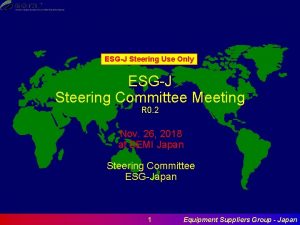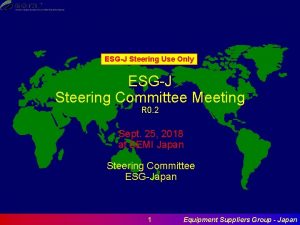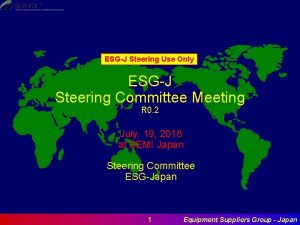Sixth GFTADs for Europe Steering Committee meeting RSC












- Slides: 12

Sixth GF-TADs for Europe Steering Committee meeting (RSC 6) Report on the GF-TADs /FAO workshop on Brucellosis in the Balkans Dr Andriy Rozstalnyy Animal Production and Health Officer Food and Agriculture Organization Regional Office for Europe and Central Asia Sixth GF-TADs for Europe Steering Committee meeting (RSC 6) • 30 September - 1 October 2015 • Brussels, Belgium

Report on the GF-TADs /FAO workshop on Brucellosis in the Balkans Subregional workshop on brucellosis control in Western Balkans and South Caucasus countries was organized by FAO in collaboration with the World Organization for Animal Health (OIE) under the umbrella of GF-TAD. The workshop took place in Skopje, TFYR Macedonia 12 to 13 November 2014 Attended by the representatives from Albania, Armenia, Azerbaijan, Bosnia and Herzegovina, the Former Yugoslav Republic of Macedonia in addition to Representatives from • FAO Mr Ahmed El Idrissi, Mr Andriy Rozstalnyy and Mr Abdul Baqi Mehraban and Ms Mieghan Bruce, International Consultant from the Royal Veterinary College of the University of London • OIE Mr Stanislav Ralchev and • the United States Department of Agriculture Ms Hala Toubia-Rahme. Sixth GF-TADs for Europe Steering Committee meeting (RSC 6) • 30 September - 1 October 2015 • Brussels, Belgium

Objectives of the Workshop Topics addressed in the workshop include: • An overview of the epidemiological situation of brucellosis and control programmes in each country. • The FAO framework for progressive control of brucellosis presented as a guide for developing sustainable control programmes. • The economics of brucellosis and its control with focus on methodologies for estimation of the losses caused by brucellosis and cost-benefit analysis of different control strategies in support of decision making. Sixth GF-TADs for Europe Steering Committee meeting (RSC 6) • 30 September - 1 October 2015 • Brussels, Belgium

Country presentations • Veterinary and human health authorities in participating countries are deploying efforts to reduce brucellosis disease rates in livestock and humans. • The veterinary services in Albania, Azerbaijan, Bosnia and Herzegovina, and TFYR Macedonia are using the internationally recommended strategy either based on whole flock vaccination with ocular Rev 1 vaccine in sheep and goats for the first year followed by vaccination of replacement stock in subsequent years, or on vaccination in combination with test and slaughter of positive reactors. • The Armenian veterinary services have yet to adopt a control strategy based on vaccination. Sixth GF-TADs for Europe Steering Committee meeting (RSC 6) • 30 September - 1 October 2015 • Brussels, Belgium

Country presentations • All five countries implement bovine brucellosis control strategies based on test and slaughter alone. • Azerbaijan plans to start vaccination of heifers using S 19 or RB 51 vaccines in 2015. • The prevalence of brucellosis in small ruminants seems to be decreasing in countries where vaccination with ocular Rev 1 vaccine is being used. Sixth GF-TADs for Europe Steering Committee meeting (RSC 6) • 30 September - 1 October 2015 • Brussels, Belgium

OIE presentation • the OIE code requirements and procedures relevant to brucellosis, recalling the OIE tools such as WAHIS, PVS pathway. • OIE reference laboratories and Laboratory twining. The participants have expressed interest in these tools urging OIE to expand the Laboratory Twining Programme in the region in order to strengthen the laboratory capacity for brucellosis. Sixth GF-TADs for Europe Steering Committee meeting (RSC 6) • 30 September - 1 October 2015 • Brussels, Belgium

FAO presentations FAO has developed a framework with a stepwise approach for progressive control of the disease. It consists of four stages, each with desired outcomes and activities for reaching these outcomes. 1 2 4 3 The four stages of the roadmap are carefully crafted to allow veterinary authorities easily to determine the specific stage at which any livestock system in a particular zone, or the entire country, may currently be. Situation Unknown situation of the disease No structured control activities Situation Known situation of the disease with a control programme under way Situation Brucellosis at low levels within susceptible livestock population Outcome Better understanding of the disease situation Outcome Brucellosis infection rates falling in livestock Outcome Reduced impact of brucellosis in livestock and humans Activities Implement the agreed control plan Monitor the plan for quality and progress Facilitate public health and animal health collaboration Activities Risk analysis to revise control strategy as appropriate Implement revised control plan Enhance surveillance and monitoring Activities Baseline survey and epidemiological investigations Develop an appropriate control strategy and action plan Inform stakeholders Situation No evidence of brucellosis in livestock No human cases Outcome Self-declared freedom from brucellosis with or without vaccination Activities Provide data to support brucellosis -free status according to OIE standards Investigate and clear all suspected brucellosis cases Monitor and maintain disease free status Level of brucellosis declining in livestock and humans Capacity of national veterinary services improving Sixth GF-TADs for Europe Steering Committee meeting (RSC 6) • 30 September - 1 October 2015 • Brussels, Belgium

FAO presentations • The framework was first tested at a regional meeting in April 2013 in Izmir (Turkey), with the participation of chief veterinary officers or their representatives from ten countries in Eastern Europe and Central Asia. • The modified framework was presented again in this meeting for discussion and analysis by the participants. • The 4 stages and activities of the framework were discussed in break up groups. No major changes were proposed to the framework as presented in the meeting. Sixth GF-TADs for Europe Steering Committee meeting (RSC 6) • 30 September - 1 October 2015 • Brussels, Belgium

FAO presentations The control programme needs to be technically feasible, economically efficient, politically sustainable and socially and culturally acceptable. Therefore the evaluation of a Brucellosis Control Programme seeks to answer the fundamental question: “Has it (if ex post) or will it (if ex ante) achieve its goal? ” Two presentations on the impact of brucellosis and cost-benefit analysis. What is meant by disease impact and why and how to measure it. The impact of brucellosis can be manifested in different ways including physical disability, morbidity, mortality, emotional distress, social difficulties and isolation, and financial and economic losses. Each manifestation can be seen at the level of the individual, the family and household, the local community and the rest of society. Sixth GF-TADs for Europe Steering Committee meeting (RSC 6) • 30 September - 1 October 2015 • Brussels, Belgium

FAO presentations The second presentation described the economic analysis to make rational choices and decisions in the allocation of scarce resources with competing alternatives, and to make sure that the proposed brucellosis control strategy is technically feasible, economically beneficial and socially and culturally acceptable. After these presentations, the participants were engaged in a practical exercise using a model for the estimation of the cost-benefit ratio of brucellosis control in different countries. Sixth GF-TADs for Europe Steering Committee meeting (RSC 6) • 30 September - 1 October 2015 • Brussels, Belgium

Recommendations • • • Countries should be encouraged to publish and share data on brucellosis in livestock and humans, as well as on progress made in disease control. Countries should explore the possibility of establishing a formal sub-regional platform for information sharing and cross border cooperation. The potential for regional control programmes is seen as a priority, given that cross border movement of animals is a common practice in the region. Countries to explore opportunities for assistance from reference laboratories- and engage in OIE twinning on laboratory capacity development. Countries expressed interest in establishing a regional leading laboratory to serve the need for specific studies on brucellosis and advanced laboratory techniques including molecular diagnostics, identification biovars, harmonization of protocols in line with EU Reference Laboratories and/or OIE manuals to ensure the results are comparable. Countries to engage in brucellosis vaccines and diagnostic reagents testing and quality control as part of their national surveillance and control programmes. Countries conducting studies on the impact studies and cost benefit analyses to provide robust evidence for better decision-making is critical and ensure the government provides adequate financial and operational support. Sixth GF-TADs for Europe Steering Committee meeting (RSC 6) • 30 September - 1 October 2015 • Brussels, Belgium

THANK YOU FOR YOUR ATTENTION Sixth GF-TADs for Europe Steering Committee meeting (RSC 6) • 30 September - 1 October 2015 • Brussels, Belgium

